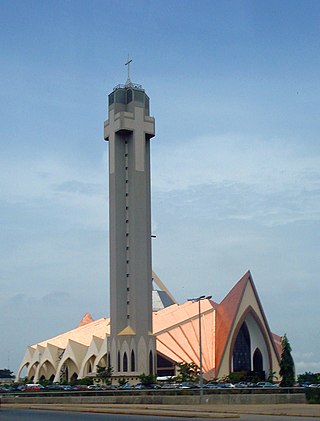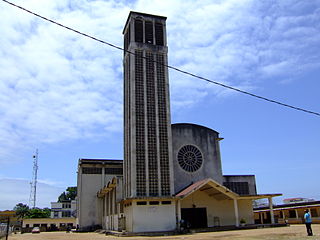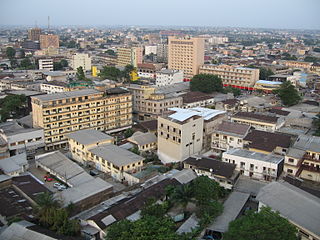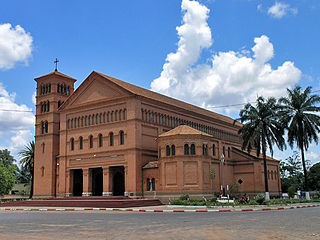
The Catholic Church in Algeria is part of the worldwide Catholic Church, under the spiritual leadership of the Pope in Rome.
The Catholic Church in Guinea is part of the worldwide Catholic Church, under the spiritual leadership of the pope.

The Catholic Church in Madagascar is part of the worldwide Catholic Church, under the spiritual leadership of the Pope in Rome.
The Catholic Church in the Central African Republic is part of the worldwide Catholic Church, under the spiritual leadership of the Pope in Rome.

The Catholic Church in Zambia is part of the worldwide Catholic Church, under the spiritual leadership of the Pope in Rome.

Religion in Nigeria is diverse. The country is home to some of the world's largest Christian and Muslim populations, simultaneously. Reliable recent statistics do not exist; however, Nigeria is divided roughly in half between Muslims, who live mostly in the northern region, and Christians, who live mostly in the southern region of the country. Indigenous religions, such as those native to the Igbo and Yoruba ethnicities, have been declining for decades and been replaced by Christianity or Islam. The Christian share of Nigeria's population is also now on the decline, due to a lower fertility rate relative to the Muslim population in the country.

The Catholic Church in Sudan is part of the worldwide Catholic Church, under the spiritual leadership of the Pope in Rome.

The Catholic Church in Mauritius is part of the worldwide Catholic Church, under the spiritual leadership of the Pope in Rome.
The Catholic Church in the Cape Verde is part of the worldwide Catholic Church, under the spiritual leadership of the Pope in Rome. The country is divided into two dioceses: Mindelo and Santiago de Cabo Verde.

Christianity in Africa arrived in Africa in the 1st century AD and in the 21st century, the majority of Africans are Christians. Several African Christians influenced the early development of Christianity and shaped its doctrines, including Tertullian, Perpetua, Felicity, Clement of Alexandria, Origen of Alexandria, Cyprian, Athanasius and Augustine of Hippo. In the 4th century, the Aksumite empire in modern-day Ethiopia and Eritrea became one of the first regions in the world to adopt Christianity as its official religion, followed by the Nubian kingdoms of Nobatia, Makuria and Alodia and several Christian Berber kingdoms.

Christianity in Nigeria represents one of several religious traditions in the country, including Islam and Traditional African religions.
The Constitution of Cameroon provides for a secular state with freedom of religion.

Christianity is the predominant religion in the Republic of the Congo, with Catholicism being its largest denomination.

Christianity is the most widely professed religion in Zimbabwe, with Protestantism being its largest denomination.

Christianity is the majority religion in Cameroon, with significant minorities of the adherents of Islam and traditional faiths.

Christianity is the most widely professed religion in Tanzania, but in the island of Zanzibar most of the population is Muslim.

Douala is the largest city in Cameroon and its economic capital. It is also the capital of Cameroon's Littoral Region. It was home to Central Africa's largest port, now being replaced by Kribi port. It has the country’s major international airport, Douala International Airport (DLA). It is the commercial and economic capital of Cameroon and the entire CEMAC region comprising Gabon, Congo, Chad, Equatorial Guinea, Central African Republic and Cameroon. Consequently, it handles most of the country's major exports, such as oil, cocoa and coffee, timber, metals and fruits. As of 2023, the city and its surrounding area had an estimated population of 5,066,000. The city sits on the estuary of Wouri River and its climate is tropical.

Christianity is the majority religion of the Democratic Republic of the Congo and is professed by a majority of the population.
The Presbyterian Church in Cameroon (PCC) is a Reformed and Presbyterian denomination in Cameroon. It is the largest English-speaking church in the country and the largest Reformed one, a member of the World Communion of Reformed Churches, as well as the World Council of Churches. In addition to its religious activities, the PCC contributes to provision of health and education services in the country. The church was established by the Basel Mission, which started to operate in the country in 1886, taking over from English Baptists, after that Cameroon had come under the protection of Germany. The PCC became autonomous in 1957.












